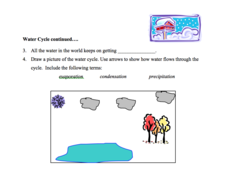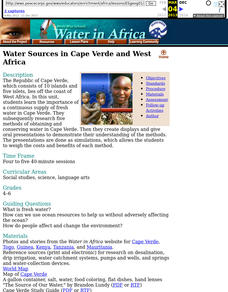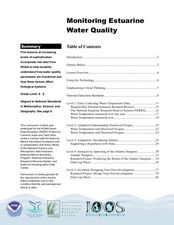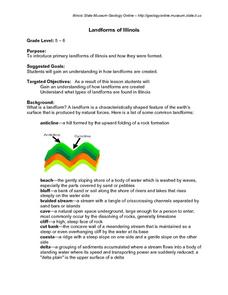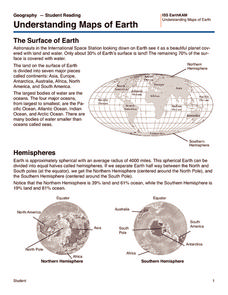Curated OER
Water, Water Everywhere!
Learners brainstorm on ways they use water, and where water comes from. They view video, Down the Drain, to gain specific facts about water use, properties of water, problems of water and the water cycle. They perform a lab activity...
Curated OER
Water Quality and Environmental Pollution
Learners use litmus paper to begin to discover the qualities of acids and bases. They learn about pH by testing clear liquids for acidity with purple cabbage juice as an indicator. The video Streamkeeper, with Bill Nye, and other video...
Curated OER
Water Cycle - A SiteMaker Presentation
Have your young scientists explore a single element of the water cycle and write a report to explain findings. Your class can take their writing through all the steps of the writing process and publish it using a Web-based multimedia...
Polar Trec
Where is the World's Water?
Scholars discover the amount of the Earth's water in various locations such as the ocean, ice, the atmosphere, etc. They then make a model of the how much water those percentages represent. Finally, analysis questions bring the concepts...
Curated OER
Water, Water, Everywhere!
Students complete a WebQuest. In this water cycle lesson, students investigate the cycle through a WebQuest activity. Students research the water cycle through Internet resources and create a documentary video of their process.
Curated OER
Making Clouds
In collaborative groups, mini-meteorologists investigate the conditions that must be present for clouds to form: cooling air, water vapor, and condensation nuclei. In addition to procedures, a chart for observations and some follow-up...
Curated OER
Designing Tools for Ocean Exploration
Students explore the complexity of ocean exploration and the technological applications and capabilities required for ocean exploration. They consider the importance of teamwork in scientific research projects.
Curated OER
Water Sources in Cape Verde and West Africa
Young explorers study the scarcity and importance of a continuous supply of fresh water in Cape Verde. They research the five main ways that fresh water is obtained in these countries. Each research group prepares a presentation, and...
Curated OER
T3 Lesson Plan: Number 3
Sixth graders investigate local water. In this water cycle lesson, 6th graders take samples from surrounding water sources. Students record data from the samples, compare and graph the results.
Baylor College
Tools of Magnification
Life science learners need to be able to use a microscope. With this comprehensive resource, they first experience how lenses and magnification work, and then get familiar with using a compound microscope. Tremendous background...
Curated OER
Monitoring Estuarine Water Quality
Students analyze water quality data from real data. In this environmental science instructional activity, students examine how salinity and dissolved oxygen affect the living organisms in the estuary. They interpret graphs to support or...
Purdue University
Design of an Earthen Dam for a Lafayette Neighborhood
How do dams support bodies of water? Scholars engage in a hands-on STEM activity where they design, build, and test dams to learn about bodies of water and how humans use natural resources. They learn how criteria and constraints affect...
NOAA
Seafood and Human Health
Whether your young biologists realize it or not, humans play a significant role in marine ecosystems. To help them understand this fact children first create graphical representations that show homo sapiens' place in marine food chains,...
NOAA
Mapping the Deep-Ocean Floor
How do you create a map of the ocean floor without getting wet? Middle school oceanographers discover the process of bathymetric mapping in the third installment in a five-part series of lessons designed for seventh and eighth graders....
Science 4 Inquiry
Deforestation
Young scientists observe deforestation from satellite photos and discuss the importance of forests to the global environment. They then simulate a plot of forest when farmers move into the area over the course of seven years. Finally,...
Virginia Department of Education
The Germ Theory and Koch’s Postulates
Explore the history of cholera and its effect on society with your biology class. Young biologists will then proceed to grow their own germs, prepared from live cultures, and follow the steps of the scientific method to generate data....
Curated OER
Landforms of Illinois
Fifth and sixth graders are introduced to the primary landforms of Illinois and discover how they were created. Landform cards are made for each pupil. They use the twenty-questions format until they have identified each one. Then,...
University of Georgia
Heating and Cooling of Land Forms
Compare heating and cooling rates of different land forms. A lab activity has groups collect data on the rate of heating and cooling of soil, grass, saltwater, fresh water, and sand. An analysis of the rates shows how the different land...
NOAA
Technology I
Isn't technology great? The 12th installment of a 23-part NOAA Enrichment in Marine sciences and Oceanography (NEMO) program introduces technology that marine scientists use. Pupils take part in an activity using conductivity,...
Curated OER
Finding the Way
Students identify and research navigational tools used in deep sea explorations. They are introduced to a compass, the Global Positioning System and sonar technology and then describe their uses in underwater exploration.
Curated OER
Pooper Scooper
Science Students build a pooper scooper tool that helps them clean up after a dog without getting their hands dirty or their noses too close. They research the diseases that can be transported through animal waste and work in teams to...
National Wildlife Federation
Ghost Town
Around 93 percent of the reefs on Australia's Great Barrier Reef have been bleached, and almost one quarter of them are now dead. Scholars research the sea temperatures, especially around the areas with coral reefs, to make connections...
Institute for Geophysics
Understanding Maps of Earth
Here is your go-to student resource on primary geography concepts, including facts about the surface of the earth and its hemispheres, latitude and longitude, globes, types of maps, and identifying continents and oceans.
Curated OER
Plum Stone Dice Game
Students read about a Native American dice game online. They make replica games, and practice playing with them. They predict the outcome of the dice rolls by completing a dice throw chart.


